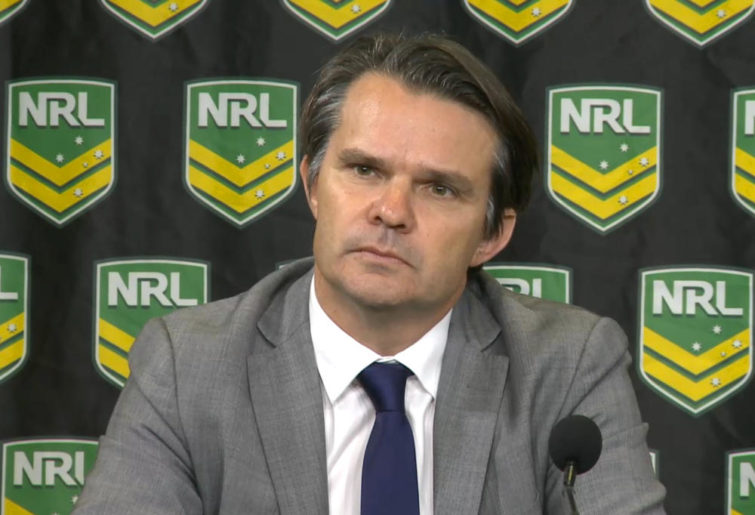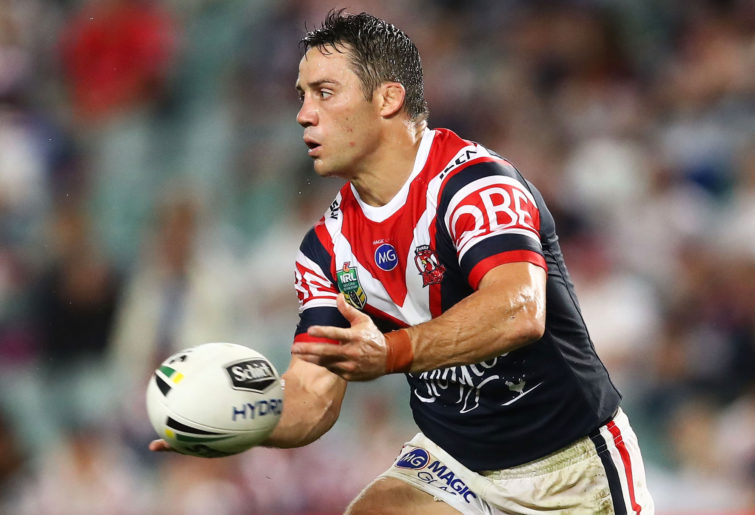Less money in business is pretty much universally considered a bad thing. Yet the NRL would have you believe that third-party agreements (TPAs) going down in value by almost $2 million is a win.
It was revealed this week that the total number of TPAs for 2019 was $6 million, compared to $7.8 million in 2018.
While fairly acknowledging that the TPA market copped a significant hit due to the retirements of Billy Slater and Johnathan Thurston – the Cowboys’ total went from $350,000 last year to just $16,000, which gives you an idea how much JT was on – NRL chief operating officer Nick Weeks was keen to spin it as a positive.
“The reduction reflects the retirement of some of the game’s elite players and the effectiveness of additional checks and balances we have put in place to identify noncompliance with the rules are working,” Weeks said.
“We recognised the genuine concerns our clubs and fans had about third-party agreements. That’s why we introduced more strenuous measures to ensure these arrangements are genuine arms-length deals.”

(NRL.com)
He’s not opened with “good news everyone”, but Weeks has not addressed the elephant in the room – that what should be a significant source of player income has dropped in a dramatic fashion.
It’s not just a loss in monetary value either, with NRL.com reporting “the number of players with agreements dropping from 94 to 81 in the past 12 months”, while “total agreements has also dropped from 205 to 172”.
JT and Billy the Kid were once-in-a-generation players, sure, but they don’t account for 33 total deals – nor, shockingly, are they 13 people.
This is a problem and it needs to be addressed.
If the NRL’s additional checks and balances to identify noncompliance have resulted in $1.8 million being slashed from an income stream, those checks and balances need to be checked and balanced.
TPAs have long been considered a murky world and tend to be the source – or certainly where the finger is pointed – when a salary cap breach occurs.
But just because it’s been poorly implemented to date doesn’t mean it’s an inherently bad system.
A third party deciding to sponsor a player is a good thing – again, it means more money coming into the game – and when it’s a multimillion-dollar part of rugby league business, HQ should be charged with cultivating it.
Instead they have put in place rules that have seen this particular market dip by almost 25 per cent.
In any business in the world, when one of your revenue streams goes down by a quarter and you can isolate that your own systems are the root cause, you don’t celebrate those systems.
Nick, real easy for you. More money equals good. Less money equals bad.
A fair system needs to be put in place, but if your idea of fair means you lost $1.8 million, you need to re-evaluate.
The NRL should be the biggest advocates for TPAs – and in fact they actually organise extra contracts for certain players as “whole of game sponsorship”. Of course the fact that these particular sponsorships are not included in the TPA breakdown means we’re back to square one on murkiness, with NRL.com noting that the Roosters – paupers that they are, with only $69,000 in TPAs – are benefitting significantly on account of both James Tedesco and Cooper Cronk getting some (probably a lot) of that sweet, sweet, totally-not-a-TPA-because-it’s-for-the-whole-game money.
I get it, because Cronk and Tedesco are amazing players and seem like nice people – totally the kind of fellas you’d want promoting your game.

(Brendon Thorne/Getty Images)
But head office should be obligated to help all clubs get similar deals for players.
And it’d be manageable too, because the part about these deals that is generally ignored is that it’s not free money. A player signs a deal with a third party and then actually has to do work in order to be paid.
Sure, it’s probably pretty cruisy work – appear in a few shonky ads, attend an opening, maybe speak at a corporate event – but it’s work all the same, and players at all clubs have skills and abilities that go beyond the footy field.
Why doesn’t head office create a register for all players and make it searchable based on a company’s needs and budget as well as a player’s abilities (and be honest about these abilities, because way too many boring, boring blokes need to be told they’re not media personalities)?
Only got a couple of grand? You’re probably not going to get Benji Marshall to spruik your goodies, but it may turn out that one of the Tigers’ lesser lights will do it for that price. And who knows, he may turn out to be a charming, hardworking young man whose presence increases sales, and a great business relationship could grow from it.
We whinge about players being having too much spare time. Well, how about the NRL tries a bit harder to put them to work?
It’s two birds with one stone as well – increasing incomes while also helping players prepare for life after football (or ‘life’ as the rest of the world calls it).
Look, maybe this year was a one-off, an adjustment due to these new rules, and we’ll see that $1.8 million return with interest in 2020.
But the NRL should be working hard to ensure this is the case.
Because – really, I need to say it? – losing $1.8 million, a dip of almost 25 per cent, is not a good news story.






























































































